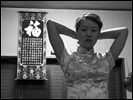Identity
- Year
- 2004
- Original title
- Sekirara
- Japanese title
- セキ☆ララ
- Director
- Cast
- Running time
- 115 minutes
- Published
- 18 January 2008



by Johannes Schönherr
The young zainichi director Tetsuaki Matsue made his first mark with his 1999 graduation film Annyong Kimchee (1999), a documentary in which he explored his own troubled relation to his Korean ancestry in modern-day Japan. Soon after, he joined the world of Adult Video (AV) but stayed true to his original theme: the personal stances of second and third generation foreigners in Japan. In Identity, released as Sekirara (They Bare It All) to Japanese movie screens, he explores the lives of two fellow zainichi Koreans working in the AV industry. They do bare it all - their most intimate thoughts as well as their bodies in action.
Zainichi are "resident foreigners" in Japan. Typically, the term refers to Koreans who moved to Japan during the period when Korea was a Japanese colony (1910 - 1945) or who were brought there as forced laborers during WWII. Many of them stayed on in Japan after the war but did not quite join Japanese society. They considered themselves as foreigners in a land where they were not particularly welcome, they lived largely within their own communities and held on to their allegiances to the respective part of Korea they felt politically and historically connected to: to this day, there are zainichi with South Korean and zainichi with North Korean passports. And then there are the folks who are technically Japanese - those who have become naturalized citizens - but who have their Korean ethnicity still strongly on their minds. Tetsuaki Matsue belongs to the latter. His parents switched nationalities when he was 5 years old and took him with them. He grew up Japanese but later went on searching for his true ethnic identity.
The result was Annyong Kimcheee, a very personal and deep, but also very funny documentary about his attempts to find out where he stands. The film ran at a great number of international festivals and eventually caught the eye of Adult Video producer Company Matsuo. Matsuo, famous for his hamedori porn documentaries, in which he not only shoots himself having sex with girls who answer his magazine ads but who also tries to get to understand the personal worlds those various girls he meets inhabit, felt that Matsue had employed a very similar documentary approach in Annyong Kimchee. Minus the sex, of course. But this insignificant detail could be worked on... In short, Company Matsuo offered Matsue to produce his next film. It turned out that Matsue loved to work in porno as long as he could do whatever he wanted in the genre - and that was certainly a given with Matsuo. The result of this collaboration between porno auteur Matsuo and identity researcher Matsue became Identity.
The film opens with shots of a rainy beach opposite a big industrial zone in Okayama Prefecture. Sheltering from the rain on the porch of a beach bungalow, a young Japanese man tries to make sense of the girl who stands in front of him: "Since when do you know that you are a zainichi?" he asks. "From when I was very small," she answers, "My grandparents spoke Korean to each other." "What's your nationality?" "South Korean." "When do you go back there?" "I don't go back. I've a special residence permit for Japan." "So, you are Japanese?" he asks. "No, I'm not." She says. "So, what are you now? Why are you here now?" he wants to know. ""Because I'm a Korean born in Japan, I grew up in Japan. Just by chance I happened to be a zainichi. I don't really understand what zainichi means myself..." She doesn't make sense to him and he is obviously confused.
After the front credits roll, we learn that the girl is 20 year-old Hiromi Aikawa, a first-time AV actress and third-generation Korean in Japan. She has never been to South Korea, the land of her ancestors. She doesn't feel like going there, either. When Matsue mentions in his first interview with her that a trip to Korea could very well be a part of his film, she quickly declines. She would like to go with Matsue and his crew to the town she grew up in, though... This trip constitutes the first half of the movie.
Thus, Identity starts with Matsue and Aikawa meeting at Tokyo's Shinagawa Station and taking the Shinkansen speed train to Kyoto. Aikawa had spent most of her youth in Kyoto. They meet up with the production team and drive to the neighborhood she grew up in: a faceless area of pre-fabricated apartment blocks. But thanks to Tel-Club director Kenji Murakami being on the team, we get some very natsukashii pictures from there: his Super 8 shots look as nostalgic as Aikawa talks. No, she says, in Kyoto she didn't have any zainichi friends. She was surrounded by Japanese all the time and felt quite comfortable that way.
That same night, the team meets a young man, simply named Matsuyama-san in the film, in nearby Osaka. He is the AV actor assigned to work the sex scenes with Aikawa. He is Japanese and doesn't have a clue what zainichi really are. He is the young man we have seen talking with Aikawa in the opening sequence.
They do their sex scene in an Osaka love hotel. Aikawa proves to be as comfortable in showing her carnality live in front of the camera as she is totally at ease talking about her personal background to the ever questioning Matsue. Two days later, the team arrives in Onomichi, a small coastal town near Hiroshima, Aikawa's childhood hometown. Few things have changed here, even the Pachinko parlor her father used to run is still there, though it looks closed down now.
A thoroughly nostalgic road trip with a 20-year-old girl digging into her past... but despite her Korean passport and heritage she's not much different from anyone Japanese of her age... and that often alleged "discrimination" against zainichi? Well, she certainly felt being a bit different from her classmates and friends but did that turn them against her? No, it didn't. Quite a different view from the various movies trying to exaggerate and exploit the situation of zainichi for sensationalist gain like, say, Isao Yukisada's Go (2001).
The film seriously shifts gear in its second half. Here, Matsue pairs an ambitious Chinese student named Anna (Zhang Xin Qin) with a 39-year-old second-generation North Korean zainichi, Jitta Hanaoka. While it was all warm, nice, and nostalgic on the road trip to Hiroshima, here troubles begin to boil.
Not with Anna, though. She's been a student in Japan for one and a half year, she is fluent in Japanese and this is her 3rd AV. She's ambitious and says that nobody is going to stop her in whatever she likes to do. Her identity? She can't understand Matsue's question - and that's not for language reasons. What the hell is his problem? She does what she likes to do - and that's all. Family background? Yeah, a strict mother, an easygoing father. She loves them both but they have nothing to do with what she does on her own now. She's herself and that's it.
Hanaoka is her polar opposite. His father still adheres to the teachings of North Korean "Great Leader" Kim Il-sung and Hanaoka describes him as a self-absorbed brute... a person sounding vaguely reminiscent of the Kitano character in Yoichi Sai's Blood and Bones (2004). Hanaoka rebelled against his father early on - and switched his citizenship from North to South Korea. But he is still living with his father in the same apartment... "The 38th parallel runs right through our living room", he says. (The 38th parallel being the border between North and South Korea.)
He feels totally alienated from his North Korean-style upbringing and he has a serious inferiority complex towards the Japanese. He adores all things Japanese, he even defends the fact that he can't vote by saying that he, as a zainichi, is only a guest in Japan. But there is that corner in his brain, he admits, that constantly thinks: "Why am I in this situation? Why was I born as a zainichi?" After what have must been a few drinks, he turns out to be actually quite angry at being Korean, saying that he is an unlucky guy who got the wrong start with growing up in his North Korea-worshipping family.
The first half of that 2nd part of the movie was shot in Yokohama Chinatown in order to let Anna play with her Chinese ancestry. Much more interesting however are the scenes once the team sneaks into Hanaoka's Tokyo bedroom. Books on kamikaze pilots on the table, posters of Bruce Lee and other action heroes on the wall. Hanaoka certainly likes to dream about strength and masculinity. "Can your father hear us?" Matsue asks worriedly. "The old man sleeps right behind that wall." Hanaoka retorts, "But I haven't seen him in ages. Don't worry. Him and me, we live different lives now." Anna and Hanaoka go right into a sex scene on his home bed...
The sex scenes were cut very short in the theatrical version - the version that played with English subtitles at some international festivals. The Japanese DVD does indeed bare all, revealing an interesting contrast: whereas the sex between Aikawa and Matsuyama in the first part is nice and homely and feels like something friends would do with each other, Anna and Hanaoka really go at it and each other, the Chinese girl ready for anything, the ex-North Korean zainichi full of ambition to show that there's something he can do just right.
Still, the relentless Matsue keeps quizzing once Hanaoka wipes the sweat off his skin. "Our grandparents had their own country they felt being part of." Hanaoka tells him, "My parents chose to live in Japan. Now, we, their children, are said that we lost our identity between home country and general society. We can't go back and we are outsiders here. Maybe we just try to escape from our own worries about who we actually are with whatever we do... I used to have an idea of national identity. But from some point on I lost it... Gradually... I used to believe in North Korea but then I grew more and more suspicious of the government there... They do horrible things to their folks."